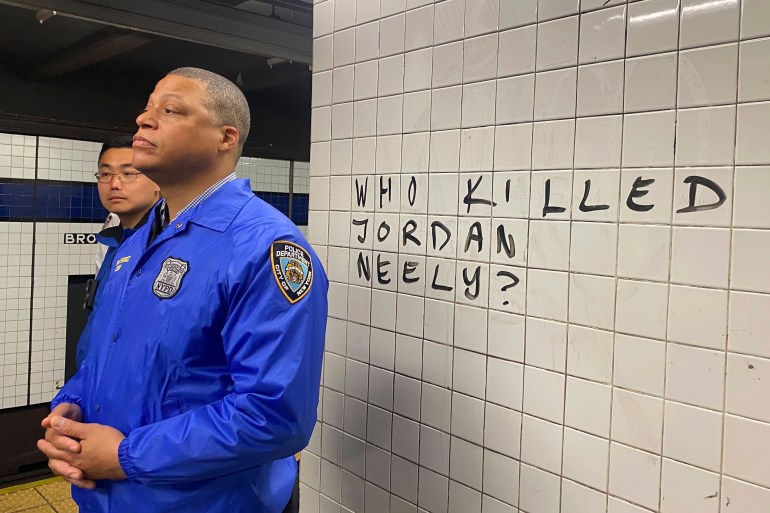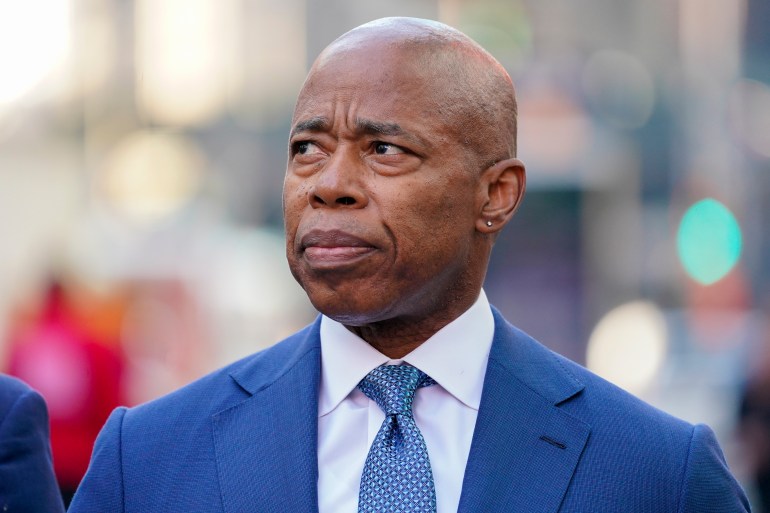Protests and calls to action are mounting in the United States after video emerged this week showing a man on a New York subway strangling a homeless passenger, resulting in his death.
A New York City medical examiner said in a report late Wednesday that the death of 30-year-old Jordan Neely, a local performer who often dances like Michael Jackson, was a homicide due to “compression of the neck.”
“If you just look at that video, you know it’s wrong. No one has the right to take the right of another person,” New York Governor Kathy Hochul told reporters Thursday. [Neely] until the last breath was extinguished from him.”
That video has sparked outrage from elected officials, particularly left-wing progressives, who said Neely’s death was symptomatic of a lack of social services and continued violence against black people in the US.
Many, including US Congresswoman Ayanna Pressley, called for accountability in the case. “Black men deserve to grow old — not get lynched on a subway because they had a mental health crisis,” Pressley wrote on Twitter.

Representative Alexandria Ocasio-Cortez, another progressive Democrat, echoed Pressley’s sentiments, criticizing New York City for raising rents and trying to “militarize itself while many in power demonize the poor.”
“Neely’s last words were literally about going to jail being easier than accessing the social safety net to get back on your feet and live a life,” Ocasio-Cortez, who represents a New York district, wrote on Twitter .
“For many vulnerable communities – especially the mentally ill – we are making life in prison easier than living out. That’s what happens when we abolish everything except the prison state.”
Prominent civil rights attorney Ben Crump also weighed in, writing, “There must be a thorough investigation into this encounter!”
However, Mayor Eric Adams, a former New York City Police Department captain who began his law enforcement career with the transit police, cautioned against jumping to conclusions about the incident.
“Any loss of life is tragic,” he said in a statement on Wednesday. “There is a lot we don’t know about what happened here, so I will refrain from further comment.”
However, Adams acknowledged that “serious mental health issues” played a role in the events leading up to Neely’s death, which occurred Monday afternoon after an altercation on a Manhattan subway line.
I represent Rikers. I can’t tell you how many times I’ve heard from COs and inmates alike that there are people out there who commit petty crimes because it’s the easiest way to get a bed and a doctor.
For many vulnerable communities – especially the mentally ill – we are making life in…
— Alexandria Ocasio-Cortez (@AOC) May 4, 2023
Local media reported that Neely was behaving erratically as he boarded the northbound F train.
Fellow passenger Juan Alberto Vazquez told New York news station WNBC that “the guy got on the subway and started giving a somewhat aggressive speech, saying he was hungry, thirsty, that he didn’t care about anything, he didn’t didn’t care that he went to prison, he didn’t care that he got a hefty life sentence.”
That’s when another passenger, a white man identified in media reports as a 24-year-old Marine, put the 30-year-old performer in a chokehold and pinned him to the floor of the subway while two bystanders helped restrain him.
“Where are the police?” a passenger can be heard in the video.

Eventually, Neely’s legs stop moving. Off screen, a voice can be heard expressing concern that the stranglehold could kill him and noticing what appeared to be Neely’s pants feces. But one of the bystanders who helps hold Neely replies, “He’s not squeezing anymore.”
According to media reports, Neely was unconscious when police arrived. He was transported to Lenox Hill Hospital but was pronounced dead.
Police later questioned the Marine, but released him without charge. Authorities also told local media in the aftermath of the incident that Neely had more than 40 previous arrests.
‘total failure’
The Manhattan District Attorney’s Office has said it will review the autopsy reports, as well as witness statements, medical records and footage of the stranglehold as part of its “rigorous ongoing investigation.”
“This is a solemn and serious matter that ended in the tragic loss of Jordan Neely’s life,” a spokesman said Thursday. “This investigation is being conducted by senior, experienced prosecutors and we will provide an update when there is additional public information to share.”
Protests in New York are expected to continue through Thursday and Friday, with many questioning Mayor Adams’ crackdown on crime and homelessness.
Last year, he launched a subway safety plan that removed people sheltering or sleeping in transit cars.
And in November, he unveiled a policy that gave city officials “legal authority to provide care to New Yorkers when severe mental illness prevents them from meeting their own basic human needs,” a program that critics noted could involve involuntary hospitalization and treatment. .

A press release from the mayor’s office said the measure was designed to address the “ongoing crisis of individuals with serious mental illnesses left untreated and unprotected on the streets and subways of New York City.”
The New York-based Coalition for the Homeless issued a statement in the wake of Neely’s death, reiterating its continued criticism of Adams’ policies.
“This appalling incident is yet another reminder that Governor Hochul and Mayor Adams have utterly failed to provide critical mental health care so desperately needed by so many people in our city,” said Dave Giffen, the group’s executive director.
“Furthermore, it is shocking that someone who took the life of a distressed, mentally ill person on a subway could be released without suffering any consequences. mentally ill.”